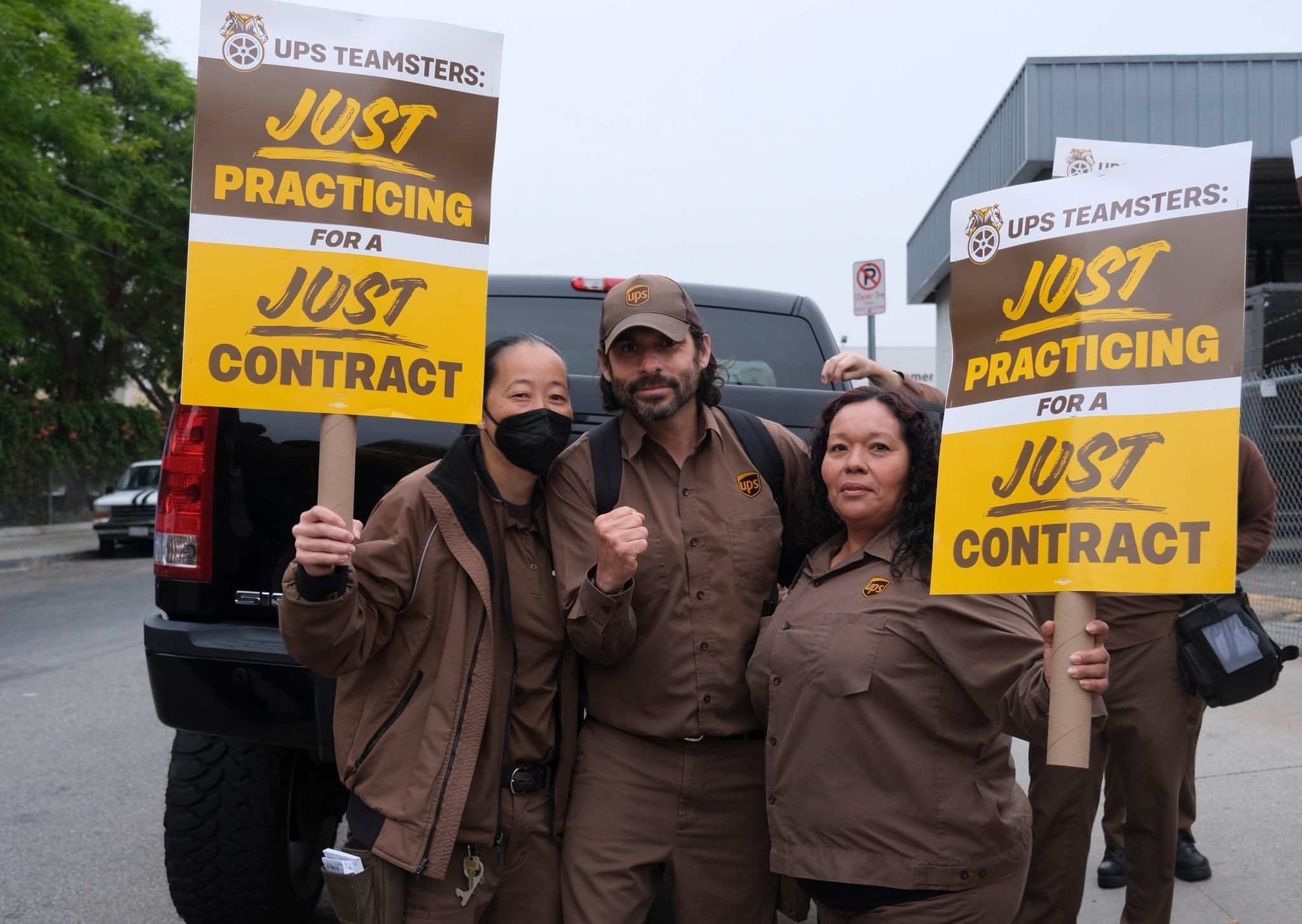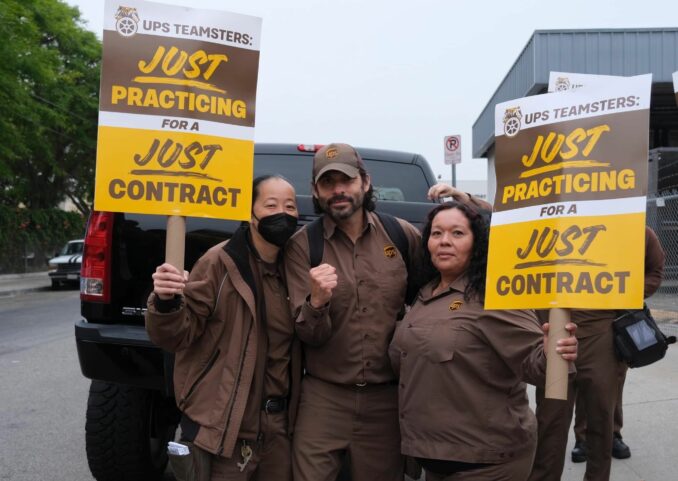

Teamsters Local 396Credit: Caption: UPS Teamsters held ‘practice pickets’ around the country, like this one on June 29, 2023, by Local 396 in Southern California. Photo websource: Teamsters Local 396 twitter
JUNE 24, 2023 BY WORKERS VOICE
Guest article, first published June 24, 2023, by Workers Voice Socialist Movement, Louisiana
Some 340,000 workers, members of the Teamsters union (IBT), worked tirelessly during the worst of the COVID-19 pandemic. Despite exhaustion from overwork, disease and family tragedies, they saved lives by delivering packages to those who were quarantined. Meanwhile, bosses at United Parcel Service lived in luxury as profits soared to $56.3 billion from 2019 to 2023. In 2023 alone, UPS says it will spend $3 billion in stock buybacks and dish out $5.4 billion in dividends. Every penny of that profit is due to the labor of the workers.


UPS Teamsters held ‘practice pickets’ around the country, like this one on June 29, 2023, by Teamsters Local 396 in Southern California. Photo websource: Teamsters Local 396 twitter
The current contract between the Teamsters and UPS expires in less than five weeks. Every day the company delays making a realistic offer to the union, the closer workers come to a strike authorized by 97% of the rank and file who voted.
The union has already achieved 55 tentative agreements on essential issues, including outfitting of new vehicles with air conditioning and retrofitting others with fans; new protections against discrimination based on gender identity and sexual orientation; increased penalties to the company for wage theft, harassment and management doing union members’ work; and a host of other items.
On June 21, the union submitted a 23-page economic proposal on critical remaining issues, including base pay and catch-up raises; elimination of the two-tiered driver classification (22.4s); cutting out subcontracting to truck companies and personal vehicle drivers; and more full-time job opportunities for part-time workers who make up 65% of the workforce. UPS responded with “an appalling economic counterproposal,” according to the Teamsters National Negotiating Committee.
UPS, know this: The union will strike Aug. 1 if necessary
CEO Carol Tome mistakenly believes she can become a capitalist hero and housebreak the Teamsters on behalf of billionaire UPS shareholders and Wall Street. But she has in fact lit a renewed fire. UPS will need to make significant offers to avert a strike.
In the June 21 update by Teamsters President Sean O’Brien and four rank-and-file negotiating team members, the union made the call to intensify unity and solidarity, practice picket lines, identify strike captains, and get information out to all members.
The union has resisted pulling back despite Wall Street’s tactic of threatening workers with a loss of jobs to other carriers. But this threat is first and foremost a problem for UPS if it loses a big chunk of the market share of logistics contracts.
Teamsters president denounces Supreme Court attack on the right to strike
On June 1 the Supreme Court ruled that a union can be held liable for damages caused by a strike. This judgment represents the strong drive by the capitalists — who control all branches of government — to destroy the most basic labor rights won through workers’ struggle and sacrifice. They ultimately seek to undermine labor’s right to carry out effective strikes that will economically injure companies.
Immediately, Teamsters President Sean O’Brien shot back: “The Teamsters will strike any employer, when necessary, no matter their size or the depth of their pockets. Unions will never be broken by this court or any other. Today’s shameful ruling is simply one more reminder that the American people cannot rely on their government to protect them. They cannot rely on their employers. We must rely on each other. We must engage in organized, collective action. We can only rely on the protections inherent in the power of our unions.”
The Teamsters union has continuously called for rank-and-file organizing, parking lot rallies, and education among the members. Rallies and trainings have taken place across the country, uniting workers of all nationalities, genders and job classifications.
Every worker, every steward and every local union official needs to do all they can to ensure that members are getting information and otherwise prepare for the possibility of a strike. The UPS Teamsters app is helpful, but in many hubs, workers still don’t know it exists. Many local officials and rank and filers are getting the word out, but other leaders resist utilizing this tool in the struggle.
Southern workers deserve equity in regional agreements
There are many Teamsters regions in UPS, each with a contract supplemental to the national contract. Regional negotiations have already resulted in tentative agreements which affect everything from vacations to pensions, grievances, sick pay and PTO.
The Southern Region is extensive, encompassing nine states. A regional comparison of past supplemental contracts reveals a vast difference in these categories. For example, a worker in Northern California gains three weeks of vacation after three years of work. In contrast, a Southern worker must work ten years to get the same amount. These disparities are mainly due to unions’ continued lack of attention to the South. Still, it also shows the need for more activity by the Southern Region leadership and some locals.
Some locals in the South have been failing to enforce current contract provisions, press grievances or mobilize members. Unions in “right-to-work” states need to sign up new members, which many locals have neglected. Signing up new members this month is especially critical, because workers who are not in the union will not get strike pay.
Many workers, particularly part-timers, don’t know there is a union, much less what it does, what the contract is or how a grievance is carried out. Most UPS workers are part-time, and many have second jobs. Now is the time to prepare workers to walk the picket line on their usual shift (if not more) and promote unity between workers with different job classifications and seniority levels. Rank-and-file members and stewards need to put in extra effort to organize, educate, and inspire their fellow workers in places where local leadership is apathetic or worse.
Strike solidarity is important and should be encouraged. But those doing it should try to understand the problems and uplift members’ leadership, not substitute for them. No union, however large or strong, can succeed in isolation. Done right, solidarity can help lift morale and provide material support.
A well-organized strike can create a revolution in class consciousness and class unity if it fosters worker leadership, especially among members who may be stepping into that role for the first time. A strike can also clear the path to a stronger union by shaking up the cozy relationships that sometimes develop between local officials and the company.
Automation (AI, robotics) and Uberization destroy jobs
Whether UPS workers strike or not, the efforts already made to strengthen the union are critical. This contract is only one battle in the class war that pits the workers against UPS and its government supporters.
In some places, UPS has imposed hiring freezes for new drivers, creating a situation where the company gets too many packages for the current fleet to deliver. UPS then hires personal vehicle drivers to fill in the gaps that the company has created. PVDs make less and get no benefits while they pick up the costs for the upkeep and insurance of their vehicle. This Uberization is a major way for UPS to lower labor costs. The company also wants to subcontract to smaller trucking companies for the company-created overflow. A subcontracted company makes a profit while their drivers get much less than Teamster drivers, driving wages down across the industry.
The Teamsters union has come to tentative agreements to prohibit the use of drones and driverless vehicles for the period of the next contract. But automation in the form of robotics and AI is already a significant threat to workers who sort and load packages. The union negotiated that UPS will notify them 45 days before any technological changes occur. This tentative agreement is good. But companies plan these changes for years, and UPS is likely looking to remove tens of thousands of inside workers who sort and load packages. The union needs to plan its offensive and lay the groundwork among the members to pursue new strategies to deal with this threat.
Unions need new ways to protect jobs and communities
Whatever you call it — AI, robotics, computerization, kiosks — it is all automation. The problem is not the technology itself. The problem is that we live in a capitalist system of private ownership of industry and business.
The capital used to retool and install new technology comes from the unpaid labor of the workers in the form of profits. The collective labor of the world’s workers could be used to our collective benefit — to make unsafe jobs safer, lessen the burden of work or shorten work hours while maintaining living wages. But under capitalism, we workers wind up financing the destruction of our own jobs.
The capitalist U.S. government — local, state, and federal — is dedicated to protecting private corporate property using our tax dollars. In May, the Biden administration announced a $140 million subsidy to launch seven new AI research centers.
We must fight to declare that workers have a property right to our jobs. Through united collective action — work actions, occupations, or general strikes — we need to assert control over the technology that our labor creates.
Hundreds of thousands of workers lost jobs in the auto and steel industries due to high-tech automation. This meant the destruction of entire communities. Some union leaders at that time thought that working with their bosses to impose tariffs on car and steel imports was the answer. While that charade played out, the companies downsized, set tiered wages and benefits and made joint agreements with automakers from abroad, who the capitalists had previously called the enemy.
The enemy was at home. As fewer workers could purchase cars, all these companies turned to military contracts with their unlimited money and war profiteering gotten by looting the federal treasury.
The best way for the Teamsters to prepare for the struggles ahead is to step up what is being done now to strengthen union forces nationally and locally for the best possible contract, and to work towards victory if it comes to a strike. Even if everything is not won, the effort to educate and inspire the rank and file to action will be necessary for the future.
Wall Street is watching. All unions need to join this battle.
This statement was recently issued by over 30 groups. On Friday, March 28, Dr. Helyeh…
When Donald Trump announced massive tariffs on foreign imports April 2, Wall Street investors saw…
The century-long struggle to abolish the death penalty in the U.S. has been making significant…
Download the PDF May Day appeal to the working class Revolutionary change is urgent! Gaza…
Philadelphia On March 26, the Pennsylvania Supreme Court denied political prisoner Mumia Abu-Jamal permission to…
There are two important and overlapping holidays on April 22: Earth Day and Vladimir Lenin’s…